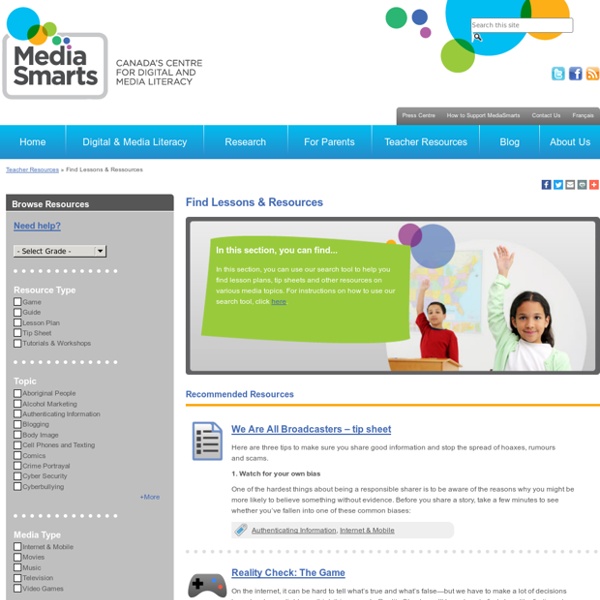



http://mediasmarts.ca/teacher-resources/find-lesson
Related: COLLECTION: Lesson Plans and Instructional Resources • lourdesrodriguezHelping Students Become Better Online Researchers Your students are probably Internet authorities. When it comes to Instagram, Twitter, and YouTube, they might know far more than you. All of that time spent tweeting and chatting doesn’t necessarily translate to deep learning though. As students progress through school, online research skills become more important — for good reason. Both college professors and employers will expect young people to know their way around the academic side of the Internet; a skill that for many students, needs to be taught. In a Pew survey, a majority of teachers said that their students lacked patience and determination when doing difficult research.
The Basics Of Digital Citizenship: 27 Power Verbs to Guide Children Online - The Basics Of Digital Citizenship: 27 Power Verbs to Guide Children Online by TeachThought Staff How can you promote digital citizenship in students? Searching the Deep Web - Bates InfoTips I recently developed a private workshop on how to find deep web resources on a specialized topic, and realized that the secret to finding information in the deep web is know that it’s a very different experience than searching the open web. While deep web content isn’t indexed by search engines, you can use search engines to find pointers, leads and links to deep web resources. Even more than with most “traditional” searches, looking for deep web content means thinking like a detective — looking for clues, using your peripheral vision to notice references or footnotes, and knowing when to step back and reassess. Following are some of the key approaches I recommend for finding deep web content on a particular topic. Use a search engine to find a page that is describing a relevant database by adding terms likely to appear the page. To find content on income inequality, for example, you might use a query like “income inequality” (database OR “data set” OR archive OR databank).
Prepositions with pictures Prepositions for Kids! Prepositions with Pictures! Learn English Preposition pictures with example sentences, videos and ESL worksheets. Learn prepositions of place and movement for kids. Prepositions with Pictures for Kids Prepositions of Place The Game of Research Summary This original board game teaches students about the research process in a fun and collaborative way. Time Required This activity takes 15-20 minutes depending on group size.
Europe Europe is the second smallest of the seven continents covering roughly 2% of the earth’s surface. The name 'Europe’ has long been thought to have been derived from the ancient myth of Zeus and Europa. According to this tale, the great god Zeus, seeing the lovely Phoenician princess Europa bathing (or, according to other versions, playing with her handmaidens) by the sea shore, transformed himself into a magnificent white bull and slowly approached her from the sea. Points of View and Omnifile Summary This activity introduces students to the concept of pre-research (establishing background information on a topic before getting into the databases) and to basic database navigation. Time Required The worksheet will take approximately 10-20 minutes to complete. The video will take four minutes to watch.
The U.S.: Major Cities The game The U.S.: Major Cities is available in the following languages: Seterra is an entertaining and educational geography game that lets you explore the world and learn about its countries, capitals, flags, oceans, lakes and more! You can access the Seterra online quiz site using your computer, phone, or tablet running the latest version of most web browsers, including Safari, Firefox, Chrome, and Internet Explorer. There’s also a Seterra app that runs on iOS and Android phones and tablets! The Seterra app offers two game modes, plus high score lists to keep track of your progress. All These Articles Summary This activity engages students in a consideration of source types and how these types can be used to inform their research. Time Required This activity will take approximately 10-15 minutes. Learning Objectives
W. Rocco AP Capstone - AHS Subject Guides: English - LibGuides at Amity Regional High School AP Capstone Database Searching and the Power of Limiters (9-2018) Information literacy topics: -Determining best sources -Searching strategies for information -Evaluating sources Allard - AHS Subject Guides: English - LibGuides at Amity Regional High School Literacy Workshop Introduction to Citations and References with NoodleTools (updated 2-2017) Information literacy topics: Organizing source citations References Using technology tools Objective: To understand and define the concept of a research “citation”, and to use a web citation generator (NoodleTools) to create citations and bibliographic references. 1: Find the activities for this class, at: Google Search→Amity Library
Evaluating Sources for Research By Caitlin Duffy Lesson Plan Grade Levels: 9–12 Objectives Students will gain skills evaluating the reliability of various types of resources. Start - Evaluating Information - LibGuides at Gonzaga University Quick question: how many animals did Moses take onto the ark? (Highlight to see spoiler): None, actually. That was Noah.